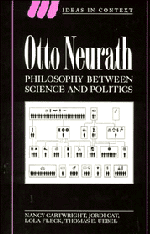Part 1 - A life between science and politics
Published online by Cambridge University Press: 17 December 2009
Summary
A tall, handsome man, bald, with a large forehead, beautifully shaped head, red full beard, and small brown eyes, a slightly Semitic (rather Egyptian) type, with fluent, intelligent, captivating speech.
This is how Ernst Niekisch described Otto Neurath in his diary in March 1919. But it was not only Neurath's outer appearance, his gigantic figure, his behaviour – considered rude by some – that impressed his contemporaries. Over and over again he was characterised as charming, friendly, witty; often as energetic, ambitious and full of purpose, a man of action. William M. Johnston wrote:
Otto Neurath (1882–1945) is one of the most neglected geniuses of the twentieth century. He made innovations in so many fields that even his admirers lost count of his accomplishments.
Over the course of his life Neurath was a business-school teacher, a military officer, a junior university professor, a commissioner for socialisation, a secretary of a housing movement, a museum director – to name but a few of his professions. Neurath's manifold activities correspond to the many stereotypes applied to him. One Austrian minister of education considered him a Communist; an old Social Democratic librarian reported that Neurath was considered an eccentric in the Social Democratic movement of the first Austrian republic. Another contemporary viewed Neurath as a Marxist who had hardly read Marx. Older citizens of Vienna still remember his permanent exhibitions in the town hall. By philosophers he is classed as a radical empiricist, while amongst economists he counts as a daring innovator, if not a misguided visionary.
- Type
- Chapter
- Information
- Otto NeurathPhilosophy between Science and Politics, pp. 7 - 88Publisher: Cambridge University PressPrint publication year: 1996



